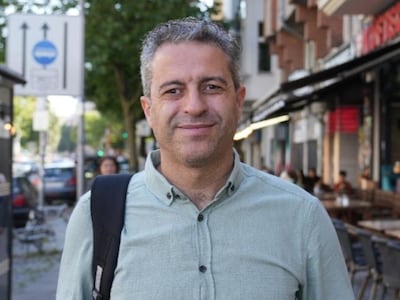Live updates: Follow the latest on the Syrian rebel advance
“I am not a refugee any more. I am just a Syrian,” said an ecstatic Sarah Hunaidi, who as a teenager in 2014 fled her hometown of Suwayda in southern Syria during the country's civil war.
Like millions of displaced Syrians around the world, she stayed awake all night watching the dramatic collapse of Bashar Al Assad’s regime. The stunning turn of events saw rebel forces sweep through Syria, conquering city after city, until Damascus fell over the weekend. Mr Al Assad fled the country, and the rebels declared Syria free.
“I can finally go back home,” Ms Hunaidi, now a Harvard University graduate, told The National. "So many years have been lost in exile. But I am a free Syrian now."
For millions of Syrians, this moment represents a mix of joy, relief and apprehension.
“I spoke to my mother and brothers who are still in Syria and we cried a lot,” said Ms Hunaidi, who was forced to flee the country after her social media posts made her a regime target. “I was just a teenager inspired by the Arab Spring. I was not a threat to anyone.
“My friends, who were just 16 or 17, got arrested and were tortured. Some had their nails pulled out, others were burnt with cigarettes or beaten with iron rods.”
After she and her family received threats from the regime, Ms Hunaidi knew she was not safe any more, she said. She escaped to Lebanon, then moved to Turkey and later to the US to study.
A decade later and thousands of miles away from Syria, the trauma of displacement haunts her.
While the fall of Mr Al Assad marks a new chapter, Syrian refugees know the road ahead will be long and fraught, with challenges for their nation. Yet, for the first time in more than a decade, they say they feel they are no longer defined by exile but by a new hope.
A nation shattered by war
Syria’s civil war, which began in 2011 as part of the Arab Spring protests, spiralled into one of the worst humanitarian crises of the 21st century. The Assad regime’s brutal crackdowns left more than half a million dead and displaced more than 12 million people, forcing nearly half of Syria’s population to flee their homes.
Cities were reduced to rubble, and the regime’s forces were accused of war crimes, including chemical attacks, mass torture, and indiscriminate bombing of civilians.
As Syria descended into chaos and violence, a mass exodus of people began. Syrians risked everything to cross seas and borders in search of safety. Many drowned in the Mediterranean, while others endured hostility, political apathy, and xenophobia in host countries.
The Syrian refugee crisis not only uprooted millions but also altered global politics. More than five million Syrians sought refuge in neighbouring countries like Turkey, Lebanon and Jordan, while others braved perilous journeys to Europe. The influx of refugees spurred the rise of xenophobic political movements and anti-immigrant policies in many European nations, reshaping attitudes towards migration.
According to the European Commission’s 2024 humanitarian overview, Syria remains in dire straits, with 16.7 million people still in of need humanitarian assistance.
But despite all the challenges, Syrians feel a glimmer of hope as the Assad regime comes to an end.
Amira Hassan, a Syrian mother of three who fled to Germany in 2016, told The National she wept “tears of joy" watching the regime’s collapse.
"That man [Assad] destroyed so many lives. I am happy that the blood of so many people, including my family, has not gone to waste.”
She said several of her extended family died trying to reach Europe and she has lost touch with others.
“I don’t know whether they are alive or not. At least now I want my children to have a normal life and go back home someday. Nobody wants to live as a refugee,” said Ms Hassan.
Joy, relief and cautious optimism
For Jihan Amin, a human rights lawyer in Damascus, the moment is historic. "Political prisoners have walked free from the notorious Adra prison. Some girls we know were sent there when they were just 15. Now, they are free,” said Amin.
“The whole nation is celebrating. In Damascus, Homs, and Hama, people are out in the streets, firing into the air."
However, not all feel unrestrained optimism. Kamira Sadoun, a Syrian who fled to the Netherlands in 2014, expressed reservations. “Why did we allow so much blood to flow in the streets? This liberation could have happened 14 years ago.”
Mr Sadoun, whose family remains in Syria, said he is cautiously optimistic about the rebel forces’ leadership. “The next phase may be as bloody as the last. My hope is for a Syria that is home to all its people.”
For Syrian Kurds, the moment is bittersweet. Hisham Arafat, a journalist from Qamishli who is waiting for asylum in the Netherlands, said his joy is “immense”.
“While the end of Assad’s rule brings hope, many of our Kurdish cities remain under Turkish occupation. The so-called opposition often treated us as infidels. My dream is for a Syria free of tyranny and extremism, where all its people – regardless of ethnicity – can coexist,” he told The National.
"For years, we’ve held on to a dream of returning home. Now, I hope we can rebuild a Syria where our children can grow up without fear."
While there is anxiety about the post-Assad administration, the refugees said they hoped Syrians had learnt the bitter lessons of the past.
“My hope is for a free, secular Syria where everyone is accepted despite their differences," said Ms Hunaidi. "We have endured enough.”
Timeline
2012-2015
The company offers payments/bribes to win key contracts in the Middle East
May 2017
The UK SFO officially opens investigation into Petrofac’s use of agents, corruption, and potential bribery to secure contracts
September 2021
Petrofac pleads guilty to seven counts of failing to prevent bribery under the UK Bribery Act
October 2021
Court fines Petrofac £77 million for bribery. Former executive receives a two-year suspended sentence
December 2024
Petrofac enters into comprehensive restructuring to strengthen the financial position of the group
May 2025
The High Court of England and Wales approves the company’s restructuring plan
July 2025
The Court of Appeal issues a judgment challenging parts of the restructuring plan
August 2025
Petrofac issues a business update to execute the restructuring and confirms it will appeal the Court of Appeal decision
October 2025
Petrofac loses a major TenneT offshore wind contract worth €13 billion. Holding company files for administration in the UK. Petrofac delisted from the London Stock Exchange
November 2025
180 Petrofac employees laid off in the UAE
Mountain%20Boy
%3Cp%3E%3Cstrong%3EDirector%3A%3C%2Fstrong%3E%20Zainab%20Shaheen%3C%2Fp%3E%0A%3Cp%3E%3Cstrong%3EStarring%3A%3C%2Fstrong%3E%20Naser%20Al%20Messabi%3C%2Fp%3E%0A%3Cp%3E%3Cstrong%3ERating%3C%2Fstrong%3E%3A%203%2F5%3C%2Fp%3E%0A
TO A LAND UNKNOWN
Director: Mahdi Fleifel
Starring: Mahmoud Bakri, Aram Sabbah, Mohammad Alsurafa
Rating: 4.5/5
Key figures in the life of the fort
Sheikh Dhiyab bin Isa (ruled 1761-1793) Built Qasr Al Hosn as a watchtower to guard over the only freshwater well on Abu Dhabi island.
Sheikh Shakhbut bin Dhiyab (ruled 1793-1816) Expanded the tower into a small fort and transferred his ruling place of residence from Liwa Oasis to the fort on the island.
Sheikh Tahnoon bin Shakhbut (ruled 1818-1833) Expanded Qasr Al Hosn further as Abu Dhabi grew from a small village of palm huts to a town of more than 5,000 inhabitants.
Sheikh Khalifa bin Shakhbut (ruled 1833-1845) Repaired and fortified the fort.
Sheikh Saeed bin Tahnoon (ruled 1845-1855) Turned Qasr Al Hosn into a strong two-storied structure.
Sheikh Zayed bin Khalifa (ruled 1855-1909) Expanded Qasr Al Hosn further to reflect the emirate's increasing prominence.
Sheikh Shakhbut bin Sultan (ruled 1928-1966) Renovated and enlarged Qasr Al Hosn, adding a decorative arch and two new villas.
Sheikh Zayed bin Sultan (ruled 1966-2004) Moved the royal residence to Al Manhal palace and kept his diwan at Qasr Al Hosn.
Sources: Jayanti Maitra, www.adach.ae
%3Cp%3EThe%20Department%20of%20Culture%20and%20Tourism%20-%20Abu%20Dhabi%E2%80%99s%20Arabic%20Language%20Centre%20will%20mark%20International%20Women%E2%80%99s%20Day%20at%20the%20Bologna%20Children's%20Book%20Fair%20with%20the%20Abu%20Dhabi%20Translation%20Conference.%20Prolific%20Emirati%20author%20Noora%20Al%20Shammari%2C%20who%20has%20written%20eight%20books%20that%20%20feature%20in%20the%20Ministry%20of%20Education's%20curriculum%2C%20will%20appear%20in%20a%20session%20on%20Wednesday%20to%20discuss%20the%20challenges%20women%20face%20in%20getting%20their%20works%20translated.%3C%2Fp%3E%0A
COMPANY PROFILE
● Company: Bidzi
● Started: 2024
● Founders: Akshay Dosaj and Asif Rashid
● Based: Dubai, UAE
● Industry: M&A
● Funding size: Bootstrapped
● No of employees: Nine
The President's Cake
Director: Hasan Hadi
Starring: Baneen Ahmad Nayyef, Waheed Thabet Khreibat, Sajad Mohamad Qasem
Rating: 4/5
The specs
Engine: 1.6-litre 4-cyl turbo and dual electric motors
Power: 300hp at 6,000rpm
Torque: 520Nm at 1,500-3,000rpm
Transmission: 8-speed auto
Fuel consumption: 8.0L/100km
Price: from Dh199,900
On sale: now
Sole survivors
- Cecelia Crocker was on board Northwest Airlines Flight 255 in 1987 when it crashed in Detroit, killing 154 people, including her parents and brother. The plane had hit a light pole on take off
- George Lamson Jr, from Minnesota, was on a Galaxy Airlines flight that crashed in Reno in 1985, killing 68 people. His entire seat was launched out of the plane
- Bahia Bakari, then 12, survived when a Yemenia Airways flight crashed near the Comoros in 2009, killing 152. She was found clinging to wreckage after floating in the ocean for 13 hours.
- Jim Polehinke was the co-pilot and sole survivor of a 2006 Comair flight that crashed in Lexington, Kentucky, killing 49.
Tips to keep your car cool
- Place a sun reflector in your windshield when not driving
- Park in shaded or covered areas
- Add tint to windows
- Wrap your car to change the exterior colour
- Pick light interiors - choose colours such as beige and cream for seats and dashboard furniture
- Avoid leather interiors as these absorb more heat
Getting%20there%20and%20where%20to%20stay
%3Cp%3EFly%20with%20Etihad%20Airways%20from%20Abu%20Dhabi%20to%20New%20York%E2%80%99s%20JFK.%20There's%2011%20flights%20a%20week%20and%20economy%20fares%20start%20at%20around%20Dh5%2C000.%3Cbr%3EStay%20at%20The%20Mark%20Hotel%20on%20the%20city%E2%80%99s%20Upper%20East%20Side.%20Overnight%20stays%20start%20from%20%241395%20per%20night.%3Cbr%3EVisit%20NYC%20Go%2C%20the%20official%20destination%20resource%20for%20New%20York%20City%20for%20all%20the%20latest%20events%2C%20activites%20and%20openings.%3Cbr%3E%3C%2Fp%3E%0A
The specs
Engine: 1.5-litre turbo
Power: 181hp
Torque: 230Nm
Transmission: 6-speed automatic
Starting price: Dh79,000
On sale: Now
COMPANY PROFILE
Founders: Alhaan Ahmed, Alyina Ahmed and Maximo Tettamanzi
Total funding: Self funded
So what is Spicy Chickenjoy?
Just as McDonald’s has the Big Mac, Jollibee has Spicy Chickenjoy – a piece of fried chicken that’s crispy and spicy on the outside and comes with a side of spaghetti, all covered in tomato sauce and topped with sausage slices and ground beef. It sounds like a recipe that a child would come up with, but perhaps that’s the point – a flavourbomb combination of cheap comfort foods. Chickenjoy is Jollibee’s best-selling product in every country in which it has a presence.
The%20specs
%3Cp%3E%3Cstrong%3EEngine%3A%20%3C%2Fstrong%3ESingle%20front-axle%20electric%20motor%3Cbr%3E%3Cstrong%3EPower%3A%20%3C%2Fstrong%3E218hp%3Cbr%3E%3Cstrong%3ETorque%3A%20%3C%2Fstrong%3E330Nm%3Cbr%3E%3Cstrong%3ETransmission%3A%20%3C%2Fstrong%3ESingle-speed%20automatic%3Cbr%3E%3Cstrong%3EMax%20touring%20range%3A%20%3C%2Fstrong%3E402km%20(claimed)%3Cbr%3E%3Cstrong%3EPrice%3A%20%3C%2Fstrong%3EFrom%20Dh215%2C000%20(estimate)%3Cbr%3E%3Cstrong%3EOn%20sale%3A%20%3C%2Fstrong%3ESeptember%3C%2Fp%3E%0A
Key facilities
- Olympic-size swimming pool with a split bulkhead for multi-use configurations, including water polo and 50m/25m training lanes
- Premier League-standard football pitch
- 400m Olympic running track
- NBA-spec basketball court with auditorium
- 600-seat auditorium
- Spaces for historical and cultural exploration
- An elevated football field that doubles as a helipad
- Specialist robotics and science laboratories
- AR and VR-enabled learning centres
- Disruption Lab and Research Centre for developing entrepreneurial skills
The biog
Family: He is the youngest of five brothers, of whom two are dentists.
Celebrities he worked on: Fabio Canavaro, Lojain Omran, RedOne, Saber Al Rabai.
Where he works: Liberty Dental Clinic
ENGLAND SQUAD
Goalkeepers Pickford (Everton), Pope (Burnley), Henderson (Manchester United)
Defenders Alexander-Arnold (Liverpool), Chilwell (Chelsea), Coady (Wolves), Dier (Tottenham), Gomez (Liverpool), James (Chelsea), Keane (Everton), Maguire (Manchester United), Maitland-Niles (Arsenal), Mings (Aston Villa), Saka (Arsenal), Trippier (Atletico Madrid), Walker (Manchester City)
Midfielders: Foden (Manchester City), Henderson (Liverpool), Grealish (Aston Villa), Mount (Chelsea), Rice (West Ham), Ward-Prowse (Southampton), Winks (Tottenham)
Forwards: Abraham (Chelsea), Calvert-Lewin (Everton), Kane (Tottenham), Rashford (Manchester United), Sancho (Borussia Dortmund), Sterling (Manchester City)
The%20specs%20
%3Cp%3E%3Cstrong%3EEngine%3A%20%3C%2Fstrong%3E2.0-litre%204cyl%20turbo%0D%3Cbr%3E%3Cstrong%3EPower%3A%20%3C%2Fstrong%3E261hp%20at%205%2C500rpm%0D%3Cbr%3E%3Cstrong%3ETorque%3A%20%3C%2Fstrong%3E400Nm%20at%201%2C750-4%2C000rpm%0D%3Cbr%3E%3Cstrong%3ETransmission%3A%20%3C%2Fstrong%3E7-speed%20dual-clutch%20auto%0D%3Cbr%3E%3Cstrong%3EFuel%20consumption%3A%20%3C%2Fstrong%3E10.5L%2F100km%0D%3Cbr%3E%3Cstrong%3EOn%20sale%3A%20%3C%2Fstrong%3ENow%0D%3Cbr%3E%3Cstrong%3EPrice%3A%20%3C%2Fstrong%3EFrom%20Dh129%2C999%20(VX%20Luxury)%3B%20from%20Dh149%2C999%20(VX%20Black%20Gold)%3C%2Fp%3E%0A
Meydan race card
6pm Dubai Trophy – Conditions(TB) $100,000 (Turf) 1,200m
6.35Dubai Trophy – Conditions(TB) $100,000 (Turf) 1,200m
1,800m
7.10pm Jumeirah Derby Trial – Conditions (TB) $60,000 (T)
1,800m ,400m
7.45pm Al Rashidiya – Group 2 (TB) $180,000 (T) 1,800m
8.20pm Al Fahidi Fort – Group 2 (TB) $180,000 (T) 1,400m
8.55pm Dubawi Stakes – Group 3 (TB) $150,000 (D) 1,200m
9.30pm Aliyah – Rated Conditions (TB) $80,000 (D) 2,000m




